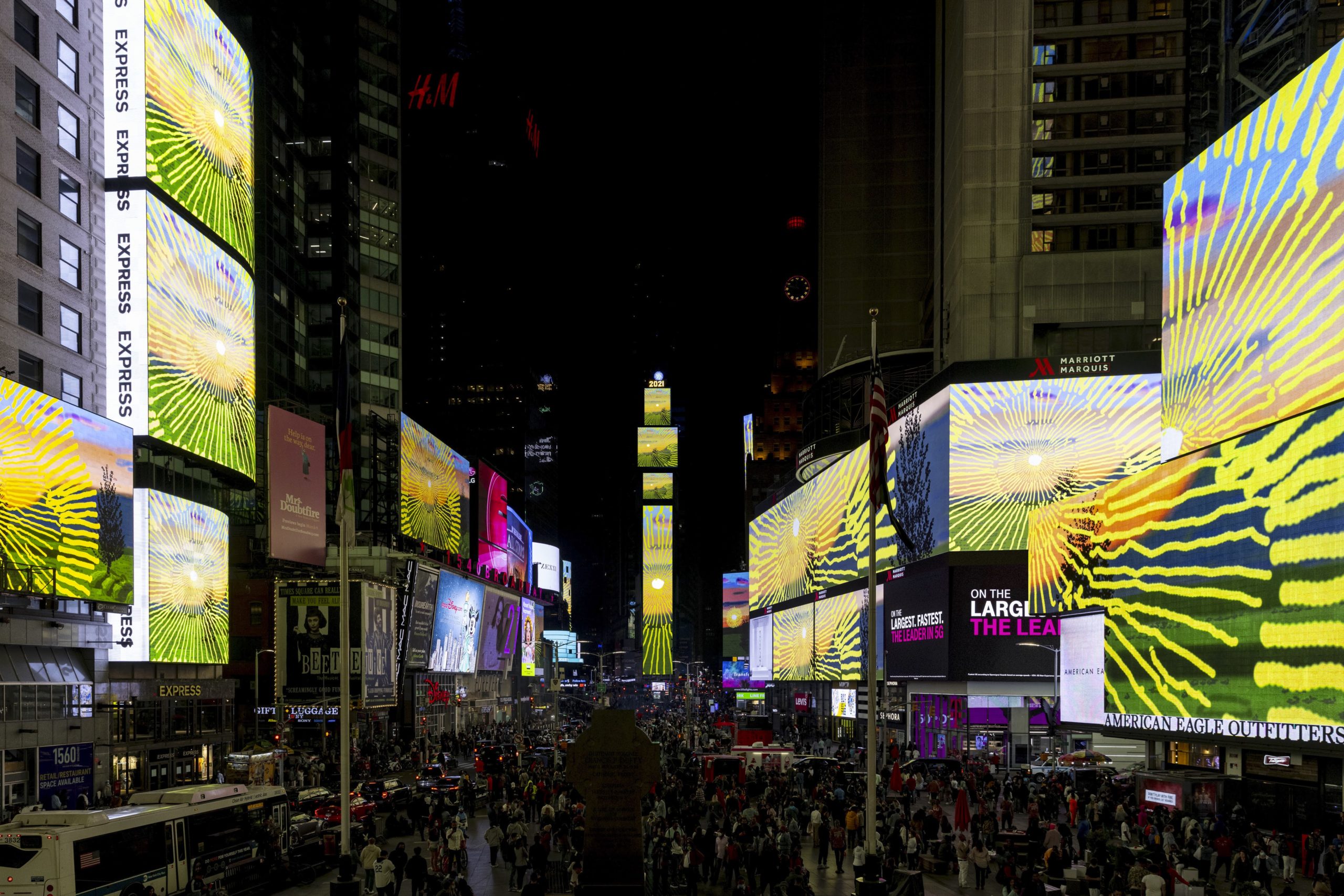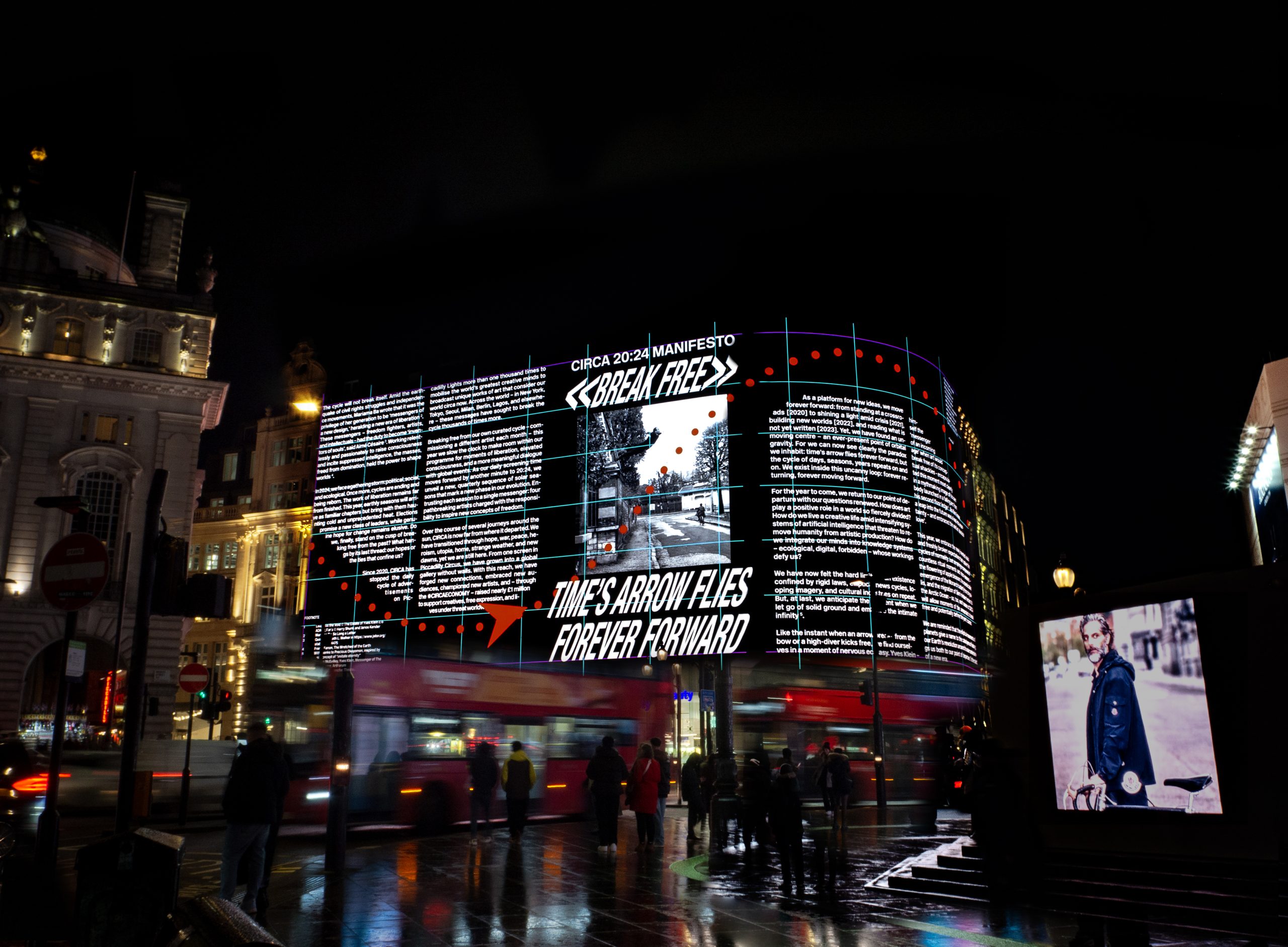About

The Cultural Institute of Radical Contemporary Arts (CIRCA) is an art and culture platform with purpose.
We stop the clock on global billboards every evening at 20:24 (local time), and mobilise the world’s greatest creative minds to broadcast unique works of art that consider our world circa now.
Each month, we sell limited edition prints by our exhibiting artists to generate funds for the #CIRCAECONOMY initiative – a circular model we designed to support our free public art programme and create life-changing opportunities for the creative community.
Our story began in October 2020, in the midst of a global pandemic, with a manifesto that challenged the concept of public art by pausing the adverts on London’s iconic Piccadilly Lights for three minutes each evening. For 365 days since, 50 artists (and counting) have presented new and immediate responses to the NOW across a growing network of screens in London, Tokyo, Times Square, Milan, Melbourne, Dublin and Seoul – sparking a dialogue both online and in the public space.
CIRCA is a beautiful if modest new model of its kind, allowing access through a normally commercial medium that has world wide reach, in order to give artists’ visual thoughts a new unexpected platform, and whose financial profits can be ploughed back to enable further vital creative impulses to flourish.
Sir Norman Rosenthal, CIRCA Advisory Council Chairman
What started off as a simple idea to reimagine the potential of London’s Piccadilly Lights has evolved into a global movement that is reconsidering the social impact that media spaces across the world can have when they are brought together and utilised with a common purpose beyond advertising.
Although the word is overused, it’s this very purpose that defines CIRCA and drives the community we are building, forward. Our vision to invest in the future of art and culture united us with artists like Ai Weiwei who called for resistance in a series of 30 films from inside protest movements in Hong Kong and beyond; Tony Cokes who broadcast the final, devastating words spoken by Elijah McClain before his death at the hands of police; Vivienne Westwood who celebrated her 80th birthday by demanding, from behind the screen, that the world embraces nuclear disarmament; AA Bronson + General Idea who continue to destigmatize HIV/AIDS by turning the conversation viral; and Patti Smith whose prose projected a vital message of hope and unity around the world, as we entered a New Year without direction.

CIRCA 20:24 MANIFESTO
<<BREAK FREE>>
TIME’S ARROW FLIES FOREVER FORWARD
The cycle will not break itself. Amid the earthquake of civil rights struggles and independence movements, Mariama Bâ wrote that it was the privilege of her generation to be ‘messengers of a new design,’ heralding a new era of liberation.
These messengers – freedom fighters, artists, and intellectuals – had the duty to become ‘inventors of souls’, said Aimé Césaire. Working relentlessly and passionately to raise consciousness and incite suppressed intelligence, the masses, freed from domination, held the power to shape worlds.
In 2024, we face a gathering storm: political, social, and ecological. Once more, cycles are ending and being reborn. The work of liberation remains far from finished. This year, earthly seasons will arrive as familiar chapters but bring with them haunting cold and unprecedented heat. Elections promise a new class of leaders, while genuine hope for change remains elusive. Do we, finally, stand on the cusp of breaking free from the past? What hangs by its last thread: our hopes or the ties that confine us?
Since 2020, CIRCA has stopped the daily cycle of advertisements on Piccadilly Lights more than one thousand times to mobilise the world’s greatest creative minds to broadcast unique works of art that consider our world circa now. Across the world – in New York, Tokyo, Seoul, Milan, Berlin, Los Angeles, Lagos, and elsewhere – these messages have sought to break the cycle thousands of times more.
Breaking free from our own curated cycle – commissioning a different artist each month – this year we slow the clock to make room within our programme for moments of liberation, elevated consciousness, and a more meaningful dialogue with global events. As our daily screening time moves forward by another minute to 20:24, we unveil a new, quarterly sequence of solar seasons that mark a new phase in our evolution. Entrusting each season to a single messenger: four pathbreaking artists charged with the responsibility to inspire new concepts of freedom.
Over the course of several journeys around the sun, CIRCA is now far from where it departed. We have transitioned through hope, war, peace, heroism, utopia, home, strange weather, and new dawns, yet we are still here. From one screen in Piccadilly Circus, we have grown into a global gallery without walls. With this reach, we have forged new connections, embraced new audiences, championed emerging artists, and – through the #CIRCAECONOMY – raised nearly £1 million to support creatives, free expression, and lives under threat worldwide.
As a platform for new ideas, we move forever forward: from standing at a crossroads [2020] to shining a light amid crisis [2021], building new worlds [2022], and reading what is not yet written [2023]. Yet, we have found an unmoving centre – an ever-present point of orbital gravity. For we can now see clearly the paradox we inhabit: time’s arrow flies forever forward, but the cycle of days, seasons, and years repeats on and on. We exist inside this uncanny loop: forever returning, forever moving forward.
For the year to come, we return to our point of departure with our questions renewed. How does art play a positive role in a world so fiercely divided? How do we live a creative life amid intensifying systems of artificial intelligence that threaten to remove humanity from artistic production? How do we integrate our minds into knowledge systems – ecological, digital, forbidden – whose workings defy us?
We have now felt the hard limits of an existence confined by rigid laws, elliptical news cycles, looping imagery, and cultural industries on repeat. But, at last, we anticipate the moment when we let go of solid ground and embrace the intimate infinity.
Like the instant when an arrow breaks from the bow or a high-diver kicks free, we find ourselves in a moment of nervous ecstasy. Yves Klein – himself the ‘messenger of an incoming age’ when art would break free of its conceptual shackles – encapsulated this moment most clearly in a mythmaking image of his own body launched in a falling arc from his second-floor ledge. As Klein knew, a leap into the future was a leap into uncertainty – and embraced the void as ‘absolute love’.
This year, we embrace the newly invented souls and freshly broken expectations that rupture the cycles of normality. Just as spring is composed of countless ritual moments and micro-seasons – the flowering of apple blossom, the unpredictable emergence of the Monarch butterfly from chrysalis, and the migration of Sámi reindeer herders to the Arctic Ocean – so, too, each season of CIRCA will allow moments of the unexpected to break free and potentially define the year’s course.
We are reminded that the elliptical movements of planets give a name to the cataclysms of history; our Earth’s revolution around its solar centre brings us both to our point of departure. To the start of a new era.
If you come back someday
You who dream also
Of this marvellous void
Of this absolute love
I know that together
Without a word to one another
We will hurl ourselves
Into the reality of this void
Which awaits our love
As I wait for you each day…
Come with me into the void!
—Yves Klein